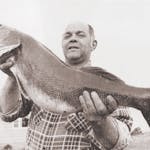In a revolt against what it says is an overabundance of wolves in the North Woods, a group of deer hunters concerned about the scarcity of whitetails has formed a new hunters rights group eager to rock the boat on the politics of wolf management.
Still in its infancy, Hunters For Hunters will rally next week to build its membership with open-invitation meetings in International Falls, Carlton, Aurora and Coleraine. Subsequent meetings are scheduled in Bagley and Detroit Lakes. The group's recent "wolf control'' meeting in Squaw Lake — announced only eight days in advance — drew a crowd estimated at more than 200 people, including three state senators.
"The chairs were full, and the people were standing all around the sides,'' said Sen. Steve Green, a Second District Republican who attended the meeting in Squaw Lake. "The interest is pretty obvious. There's a lot of frustration. A lot of frustration.''
Steve Porter of Lake Bronson, Minn., a Hunters For Hunters board member, said in an interview this week that the group has been swamped with a frenzy of interest and offers from hunters to act as volunteers. Additional meetings are being organized, he said.
"There's just too many wolves,'' Porter said. "People are livid, and they are just searching for how can we fix this problem and how can we have a voice.''
The Department of Natural Resources, which conducts wolf surveys, most recently estimated the state's population at about 2,700 wolves. Asked about Hunters For Hunters' assertion that hunters' concerns about wolves aren't registering, the DNR said Thursday that public input is fundamental to managing Minnesota's wildlife and was used to develop the current wolf plan.
In a statement, the agency said it manages "with plans grounded in science, public input, and state and federal laws," and that it will continue to connect with the public as it analyzes deer populations and sets management goals.
DNR wildlife officials have acknowledged very low deer density in the north, primarily citing a string of deep-snow winters as part of the problem. Whitetail harvest this year plummeted 35% below the five-year mean. The snow has made deer more vulnerable to wolves and other predators, the DNR has said. Another problem for deer, as identified by DNR wildlife managers in the field, is a loss of good winter habitat from agency-sanctioned logging on state land.
When a Minnesota Deer Hunters Association (MDHA) chapter put up a billboard this fall claiming wolves were devouring deer, wolf researchers pushed back and said data shows, among other things, that fawn mortality can vary year to year.
Voyageurs Wolf Project leader Tom Gable told the Star Tribune in October that getting rid of wolves would not result in what hunters want.
"There's a boatload of studies on deer fawn survival,'' Gable said. "This idea that wolves are the biggest issue is frankly kind of ridiculous, based on evidence that exists.''
Group decided to push harder
Porter said his son Dillon worked with a friend, Kyle Weber, to create the group. The two organizers placed themselves on a seven-member board of directors. The board includes avid hunter Scott Engle, a citizen member of the state DNR's wolf planning committee. He has been sounding alarms for some time about wolves preying on Minnesota's troubled moose population.
Steve Porter, a prominent deer farmer, made statewide news early in 2020 when he was ticketed by the DNR for violating a no-movement rule aimed at curbing the spread of chronic wasting disease from captive deer to wild deer. He trailered trophy bucks from his deer farm to the Minnesota Sportsmen's Show, knowing DNR conservation officers would be there to enforce the emergency rule.
He said his son and Weber staged a "soft launch'' of Hunters For Hunters before this year's deer hunting season. The two friends knew some Minnesota hunters would be coming out of the woods this fall, disappointed by the lack of harvest opportunities. That's when they accelerated their membership drive, the elder Porter said.
"This thing is brand-spanking new, but it's getting traction,'' he said.
For years, some deer hunters in northern Minnesota have been complaining about wolf predation. Earlier this year, the MDHA cut ties with Gov. Tim Walz and his deer hunting opener event. The state's largest group of deer hunters cited Walz's past opposition to wolf hunting and his stance on gun control as reasons for spurning him.
MDHA Executive Director Jared Mazurek said in an interview that the organization has been pushing the DNR for years to control wolf numbers. The group "100 percent'' supports the Minnesota trigger bill, he said, and is working for passage of a federal bill that would delist wolves and return species management back to states. The trigger bill would authorize a wolf hunt in Minnesota as soon as the species loses federal protection.
A big part of HFH's recruitment pitch is that no one is fighting for a wolf hunt. The group believes a hunt is needed.
"It's a little discouraging to have a new group come in, throwing jabs at us,'' Mazurek said. "We're on the same side of the issue.
"It's one thing to post on social media and get a bunch of 'likes,' '' he added. "It's another thing to get the work done.''
Garth Albers of Wadena is president of the MDHA executive board. He said wolves eating deer has been a hot topic among his members since at least 1989, when he first joined the board.
Albers said hunters' anguish over wolves has increased this year to where he's hearing a lot of talk about boycotting next season's hunt, blocking an important revenue stream to the DNR.
"All they're seeing is wolves and wolf tracks,'' he said.
Staff reporter Bob Timmons contributed to this report.






